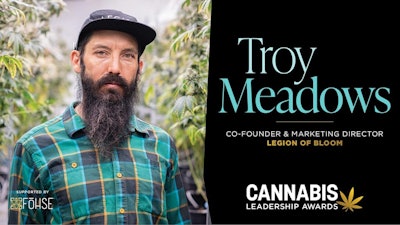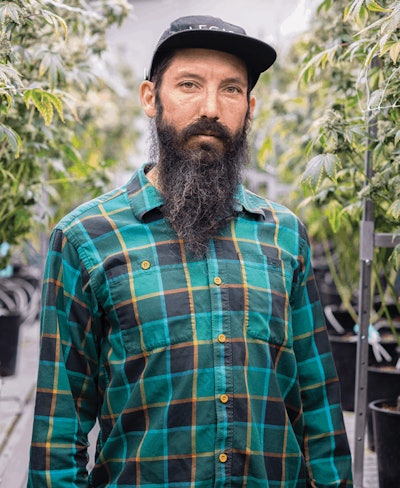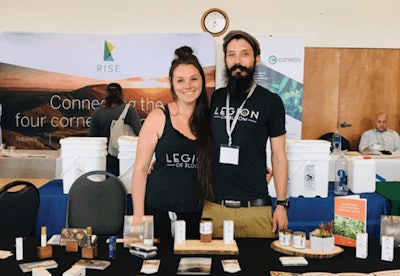

People and planet first.
That’s the focus for Troy Meadows, co-founder and marketing director at California-based Legion of Bloom, which cultivates, manufactures and distributes its brand of products—all with a commitment to sustainability.
“Everyone that touches Legion of Bloom, they know that when they come into the organization, there’s certain expectations, and the expectations are that we’re going to try to do the right thing all the time. We’re going to put the planet first,” Meadows says. “We’re going to put sustainability first.”
Meadows puts action and meaning behind his words. For example, when the company’s use of nitrile gloves quadrupled due to COVID-19-related health and safety protocols, Meadows responded by implementing a glove recycling program, where the gloves undergo a series of processes before being repurposed into new recycled plastic products.

“I’ve never met someone like Troy before in this industry because of how steadfast he is in making sure we are making the right decision,” says James Doherty, COO and interim CFO at Legion of Bloom. “So many people talk and talk and talk, but when it comes down to getting your hands dirty, they aren’t willing to do that. Troy is the exact opposite of that. He’ll walk the walk much before he’ll talk the talk.”
Legion also has an environmental stewardship program, which took “about 16 months of emails [and] barking down doors” to get off the ground, Meadows says. His persistence paid off, though, and Legion eventually was introduced to the California Association of Resource Conservation Districts (CARCD). Through the partnership, Legion makes monthly donations to CARCD from sales of its Monarch vape line to help fund Monarch butterfly habitat and restoration projects throughout the state.
Legion also works with One Tree Planted, a national organization focused on reforestation projects in wildfire-affected areas in California. These combined efforts support Legion’s commitment to sustainability, much of which is spearheaded by Meadows.
“Troy’s very motivated,” says Natalie Meadows, logistics coordinator at Legion of Bloom and Troy’s wife. “He finds projects that have meaning to him, and he really puts everything into it.”
Road to Legion
Troy’s path to the cannabis industry began in Europe, where he spent his youth. He was first introduced to cannabis culture as a teenager visiting Holland in 1996.
“Holland’s got a very rich cannabis culture from just the coffee shops, and where we used to go in Maastricht they had all these big tugboats floating in the canal [with people] enjoying cannabis. It’s a very, very cool experience,” he says. “[They have] very casual laws, a fair attitude toward policing its people; the war on drugs never really existed in Europe like it did in America. As long as you’re not hurting other people, they’re pretty okay with you just doing what works for you.”
After graduating high school, Troy moved to the United States and earned a degree in cinematography and film/video production from Full Sail University, a private, for-profit university in Florida. From there, he spent his early 20s as a self-described vagabond, hitchhiking and traveling around the U.S.
“I was homeless by choice,” Troy says of his life in the early 2000s. “I would spend about six months out of the year doing random jobs in Florida, and then spend most of the spring and summer on the road.”
While experimenting with home cultivation on the East Coast, Troy sought an environment more open to cannabis culture. During his cross-country journeys, he visited 47 of 50 states but says one state stood out.
“Spending some time in California when I was traveling, I realized this is a whole other animal,” he says. “California has always been very progressive. I was dabbling in cultivation and wanted to be in a place where it was much more conducive to the lifestyle that I wanted to live and was much friendlier to cannabis.”
After returning to the East Coast for a bit, Troy received a call from one of Legion’s other eventual co-founders that finally solidified his decision to move to the Golden State. So Troy and Natalie, who was his long-time girlfriend at the time, loaded up their Subaru and made the voyage out West.
“He was like, dude, you just have to be here,” Troy says. “I spent a lot of time in my 20s having very little and living out of a car, so it was pretty easy to make that leap. I still had a home’s worth of stuff, but it was pretty easy to let go of a lot of stuff at that point.”
Natalie admits the decision to move to California was “a big leap of faith,” but the payoff was immediate.
“Shaking off the fears of being on the East Coast and settling into the California vibe, everybody [was] just so open about [cannabis],” Natalie says. “We could both say California just felt like us.”
However, shortly after Troy and Natalie moved to California around 2008, Troy lost his mother to cancer. While certainly a difficult experience, Natalie says Troy found a renewed sense of purpose during that period.
“That was a huge metamorphosis for him,” she says. “That’s really when we started doing a lot more outdoor cultivation and getting our hands dirty outside. That’s when he started to buckle down and become more focused through that loss. There was a lot more drive.”
As California became home, Meadows built contacts and relationships throughout the cannabis industry, eventually preparing him to co-found Legion of Bloom with four friends who all connected through “a general love of music” and settled across California before 2010. (Editor’s Note: Read Cannabis Business Times’ August 2021 cover story for more on Legion of Bloom.)
“We’re founded by five cultivators, all of us working in the medical market prior to the passing of Prop 64 [The Control, Regulate and Tax Adult Use of Marijuana Act],” Troy says. “We all lived in different areas of Northern California and had carved out our own niches as far as relationships with different dispensaries and strain offerings and things like that.”
In 2015, Meadows and the co-founders examined what cannabis regulations would look like in the state and began thinking about branding. Later that year, the five pooled their resources and contacts and officially launched Legion of Bloom.
While all five founders had backgrounds in cultivation, each wore many hats in the beginning while remaining united in their commitment to sustainability.
“We’re all farmers. We really understand what it takes to hone ... [and] honor the land,” Troy says. “We see what it’s given us ..., and we all understood the ability to conserve and to use your resources in a meaningful way is something that’s very important to us.”
And after almost losing everything, Legion of Bloom does not take the land for granted.
Rebuilding Legion
Troy says his most trying time in the industry came in 2017, when the Nuns Fire burnt Legion’s entire outdoor farm to the ground.
“It was almost an extinction event for the company,” Troy says of Legion’s first location in Sonoma County. “We had put everything into that project. I’ve never worked so hard to take two steps back. When you’ve leveraged all your capital into a project, and then all of that basically just disappears overnight, that was really, really, really, really hard.”

Faced with dire circumstances, Troy relied on the work ethic he developed as a cultivator and did what he knew best: Rolled up his sleeves and got to work. He and the co-founders began picking up the pieces and working on stabilizing Legion.
“We had a core group of individuals who really believed in what we were doing, and they were willing to put in sleepless nights, too. When you know failure is not an option, you’re just willing to do what it takes,” he says. “Ultimately we were able to find a partner that was willing to take a stake in us and give us just enough to get the ship turned back in the right direction.”
That partner was Glass House Brands, a minority shareholder that helped breathe new life into the organization, providing much-needed financial support for Legion to rebuild its company—this time in an indoor cultivation facility—in Oakland, Calif., bolster its supply chain, and expand its extraction, processing, and distribution operation in Santa Rosa.
“[Troy] will always be the type of person that if there’s a problem or we have to spend a late night, he’ll be the first one there with dinner and some beverages and figuring out a way to get something done,” Doherty says. “He’s not one to point a finger and say, ‘Do it.’ He’s willing to stand next to someone and show them how to do it, and that’s one thing that I really, really respect about his leadership style.”
Troy also looked for other opportunities to recover from the wildfire, which was part of the inspiration to work with One Tree Planted to donate a portion of sales from Legion’s California Sauce Live Resin line and the company’s Pax Pod lines to plant trees in areas of California affected by wildfires.
“We’ve always believed in cannabis, and we’ve believed in the power of the plant, and we were willing to take exceptional risks in order to stay true to our beliefs,” Troy says. “We have a lot of passion, but we also have a lot of purpose, and it’s our purpose that really led us through the really dark and trying times.”
Marketing Sustainability
As Legion has grown over the years, each co-founder assumed more specific executive roles. Troy, with his degree in video and film production, became Legion’s “de-facto marketing guy,” responsible for creating the brand image and marketing plan.
“Early on, it was like, well, we just create amazing, award-winning cannabis experiences like none other. Nowadays, that’s the marketing plan of every cannabis brand on the planet,” Troy says. “It’s really about differentiating ourselves. We’ve always wanted to use Legion as a vehicle for change. We feel, as founders, companies should be responsible for their footprint and that business can be used as a vehicle for good.”
While sustainability is of utmost importance to Troy and his co-founders, he admits it was not always the easiest objective to attain during the company’s infancy. However, after Legion found its footing in the market, Meadows focused on “how can we create circles instead of lines in our supply chain?” He turned his attention to product packaging and how Legion could offer child-resistant containers and exit bags that were both eco-conscious and plastic-free, and the company eventually found partners that met its needs.
“Our vape packaging was a win-win-win-win,” he says. “It was cheaper because we removed the plastic, which is a separate piece; it’s [Forest Stewardship Council]-certified content that’s 100% recycled in a facility that uses wind energy to power their operations; and it’s made in America, so our timelines went from 12 weeks from China to six weeks. We cut our timelines in half and cut our costs by 20%—and all we had to do was make the upfront cost of the initial purchase.”
However, the 100% plant-based zipper storage pouches made from compostable materials that Legion of Bloom uses in its flower line cost about twice as much as what traditional Mylar bags cost, Troy says.
“At the end of the day, we didn’t really care what it costs because we weren’t going to add microplastics to the environment. We weren’t going to be putting out thousands and thousands of Mylar bags like every other cannabis company,” Troy says. “We were trying to create something that had a zero-waste footprint.”
“It’s people like Troy that really inspired me to commit so fully to [Legion of Bloom]. I remember asking him, ‘Why are you doing this?’ And the answer wasn’t to become rich. It was because there’s a problem in the industry, there’s a lot of bad products out on the market, and we live in an incredibly wasteful industry, as well.” James Doherty, COO and interim CFO, Legion of Bloom
Troy’s consistent commitment and efforts toward sustainability—no matter the cost or challenge—diffused across the company, its culture and its employees.
“It’s people like Troy that really inspired me to commit so fully to [Legion of Bloom],” Doherty says. “I remember asking him, ‘Why are you doing this?’ And the answer wasn’t to become rich. It was because there’s a problem in the industry, there’s a lot of bad products out on the market, and we live in an incredibly wasteful industry, as well. And I was like, ‘Wow, those are pretty inspiring things to get behind.’”
Natalie, who has known Troy for nearly two decades, also notes how he influences those around him, herself included.
“[Troy is] someone who is going to inspire you and motivate you to live your best life and to maybe take that first step of something you’re uncomfortable with, but have always wanted to do, just to see how great you can be,” Natalie says. “He inspires a lot of people to just see the best in themselves and to take challenges.”
Learning to Lead
While those around him are inspired by his values, Troy admits leadership didn’t always come naturally to him, noting his personal growth, other than the wildfire, has been the biggest challenge he’s faced during his time in the cannabis industry.
“When I was 32 years old, I thought I would just grow cannabis for the rest of my life,” Troy says. “And it’s a hard job, but it’s way different than being a full-on executive in an organization. It’s been a lot of learning for me.”
Whether it’s building a website, managing social media or creating marketing campaigns, Troy says he wears “all the hats” and has worked to develop his skills as a marketer and as an executive.
“That was probably my biggest challenge: Really owning my role and developing myself as a marketer as opposed to being a farmer that had a degree in film and video production,” he says.
And with few people in the industry to look to for support and guidance, and many wanting to protect their company secrets, Troy describes his learning as “trial by fire.”
As Legion approaches its sixth year in business, Troy has learned learned some lessons. Namely, that effective leadership is often dependent upon the team you surround yourself with.
“What it really comes down to is you need to be able to trust everyone around you to do their job,” Troy says. “You’ve got to know how to delegate and empower.”
Another lesson Meadows has learned is the necessity of clear communication when it comes to effective leadership.
“Be willing to communicate your vision of success; you can’t just think people know what you’re thinking,” Troy says. “A lot of people overlook [that] and they’re in their head a lot, so they think everyone knows what they’re thinking, and they think that everyone knows what they know.”
Troy also has advice for those currently in or looking to enter the cannabis industry, specifically.
“It’s definitely not for everyone, to be honest,” he says. “A lot of people think they’re going to get into cannabis and it’s just going to be this amazing journey. And it has been for us for sure, but it’s fraught with a lot of trials and tribulations and a lot of problem-solving and a lot of dealing with adversity. Be prepared, hold on tight, [and] be very willing to deal with whatever’s going to happen.”
While Troy admits sustainability is “a journey, not a destination,” he hopes other companies join along.
“From that environmental footprint standpoint, I just think more and more companies should think about that,” Troy says. “It’s definitely hard. I’ve spent the better part of five, six years of my life educating myself on it, and it can be really hard to make a change. I think people get used to doing what they do and until something forces the issue, they’re not going to make that change.
“So that’s what we’re trying to do at Legion, just lead by example and say, ‘Hey, we’re not the biggest [cannabis company], but we’re definitely not the smallest, and if we can make these decisions and make these changes, I don’t know why anyone else couldn’t.’”
















